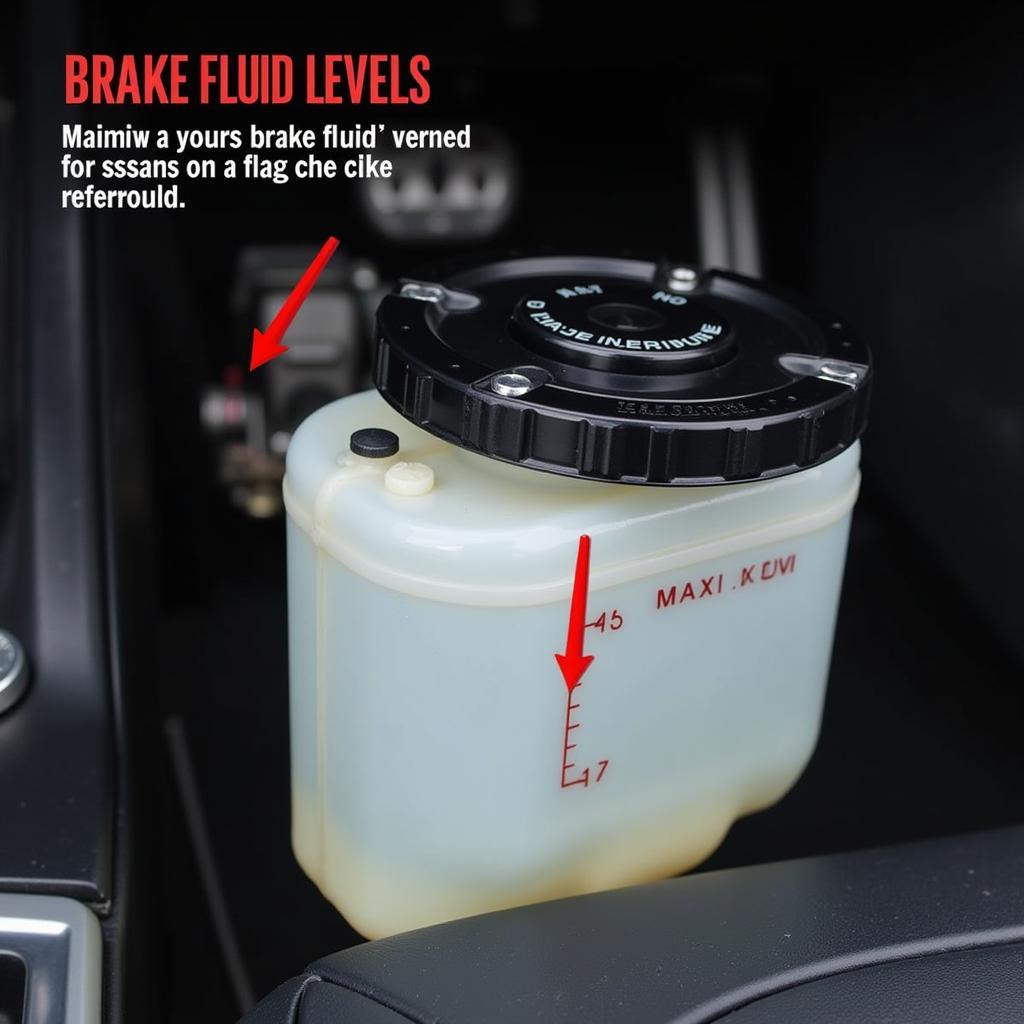A chilling scenario: It’s a frosty morning, you start your car, and the brake system warning light stubbornly glows on your dashboard. This can be unsettling, especially in cold weather. Don’t panic! This article will help you understand why your brake system warning light might illuminate in cold weather and what you can do about it.
Why Does My Brake Warning Light Come On in Cold Weather?
Several factors can cause your brake warning light to illuminate specifically in cold weather. One common culprit is low brake fluid. Brake fluid, like most liquids, contracts in cold temperatures. This contraction can lower the fluid level in the reservoir enough to trigger the warning light. This is especially true if your brake fluid is already low or due for a change. Another potential issue is moisture in the brake system. In freezing temperatures, this moisture can freeze, affecting brake performance and triggering the warning light. Think of it like frozen pipes—the same principle applies. You may also find the light appears if your car has an issue with its ABS (Anti-lock Braking System), which is more susceptible to issues in cold weather.
For a 2010 Ford Escape experiencing this issue, you might find helpful information in this article: 2010 ford escape brake warning light.
Troubleshooting Your Brake Warning Light in Cold Weather
So, what should you do if your brake warning light comes on when the temperature drops? First, check your brake fluid level. Locate the brake fluid reservoir (usually a translucent plastic container near the firewall) and inspect the fluid level markings. If the level is low, carefully add the correct type of brake fluid, following your car’s owner manual instructions. Remember, adding the wrong type of fluid can damage your brake system.
Next, listen for any unusual noises when applying the brakes. Grinding or squealing sounds could indicate worn brake pads, which can contribute to the warning light. If you’re experiencing these symptoms with a 2014 Subaru Outback, check this resource: 2014 subaru outback and brake light warning. If you suspect a problem with your ABS, avoid driving in hazardous conditions until you can get it checked by a professional.
Why is my brake warning light intermittent in cold weather?
Intermittent warning lights can be tricky. The cold can exacerbate existing, minor issues in the brake system, causing the light to flicker on and off. This might be due to a faulty sensor, wiring issue, or even a slightly low brake fluid level that only triggers the warning light when the fluid contracts further in extreme cold. If your Seat Leon is experiencing similar issues with warning lights, you might want to explore this link: seat leon 06 warning lights.
Preventing Brake System Issues in Cold Weather
Prevention is always better than cure. Before winter arrives, have your brake system inspected by a qualified mechanic. They can check for wear and tear, ensure your brake fluid is at the correct level and of the right type, and identify any potential issues before they become major problems in the cold. Regular maintenance, such as flushing and replacing your brake fluid according to your manufacturer’s recommendations, can also help prevent cold-weather brake problems.
“Cold weather puts extra stress on your car’s brake system,” says automotive expert, Michael Carter. “Regular checks and preventative maintenance can save you from costly repairs and ensure your safety on the road.” Another expert, Sarah Jones, adds, “Don’t ignore that brake warning light, especially in cold weather. It’s your car’s way of telling you something needs attention.”
How can remote diagnostics help with brake warning lights?
Remote diagnostics can sometimes pinpoint the cause of a brake warning light. By connecting to your vehicle’s onboard computer, a technician can remotely scan for error codes and identify potential problems, sometimes saving you a trip to the shop. This is especially useful in harsh winter conditions. For issues related to brake pad warning lights, particularly in an Audi Q5, this article may provide insights: audi q5 brake pad warning light. If you own an Acura Integra and notice your brake warning light illuminates when it’s cold, this resource may be relevant: integra brake warning light goes on when cold.
Conclusion
A brake system warning light in cold weather should never be ignored. While the issue may be as simple as low brake fluid, it could also indicate a more serious problem. By understanding the potential causes and taking appropriate action, you can ensure your safety and prevent further damage to your vehicle. Don’t let a brake system warning light put a chill on your winter driving.

